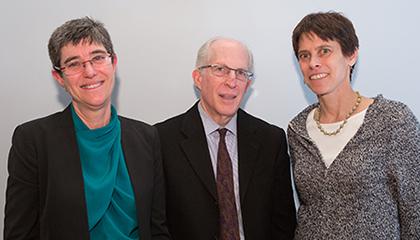Lawyering For Change
Columbia Law School Professors James S. Liebman, Suzanne B. Goldberg and Susan Sturm Talk About How Students Can Make a Difference As Part of Social Justice Initiatives' Lawyering for Change in a Changing World Series.
New York, November 11, 2013—Lawyers aiming to make positive changes in the world must target institutions with a broad range of strategies, said Columbia Law School Professors James S. Liebman, Suzanne B. Goldberg and Susan Sturm in a Nov. 4 presentation, the latest in an ongoing faculty-student workshop on Lawyering For Change in a Changing World.
Known for their work promoting social change, the three professors spoke to students interested in using law and lawyering for social change on best practices and making the most of the Law School’s many opportunities.
Liebman, the Simon H. Rifkind Professor of Law, has devoted much of his career to fighting inequality in education and criminal justice, and spent three years as chief accountability officer for the New York City public school system.
“Legal advocacy in the past has made bureaucracies better at creating a small set of rules that apply to everyone in the same equitable way,” he said. “The challenge for the future is to change these same institutions to be good at accommodating people who are not alike—to transform them into learning institutions that adapt well to diversity.”
Goldberg, the Herbert and Doris Wechsler Clinical Professor of Law and co-director of the Center for Gender and Sexuality Law, channeled insights from her noted advocacy in sexuality and gender law.
“It’s important to ask ‘where are the multiple places I can help intervene on this issue?’” Goldberg said. “I call it advocacy malpractice if you stick exclusively to one approach. Success is a question of changing the conversation, not just passing legislation or winning a case.”
| Professors Susan Sturm, James S. Liebman, and Suzanne B. Goldberg |
Sturm, the George M. Jaffin Professor of Law and Social Responsibility and founding director of the Center for Institutional and Social Change at Columbia Law School, drew on her extensive work facilitating systems change in higher education to encourage students to develop a theory of change to guide their work.
“It is important to be strategic, creative, and flexible in your use of law to promote desired change. Litigation for litigation’s sake is not going to be effective,” Sturm said. “The most successful lawyers do not define themselves by their legal tools but rather by the long-term goals they strive to advance. You must dig in to create change, because change must be embedded to be long-term.”
The talk was part of the Lawyering for Change in a Changing World series, organized by Professors Sturm, Goldberg, and Olatunde Johnson in collaboration with Social Justice Initiatives.